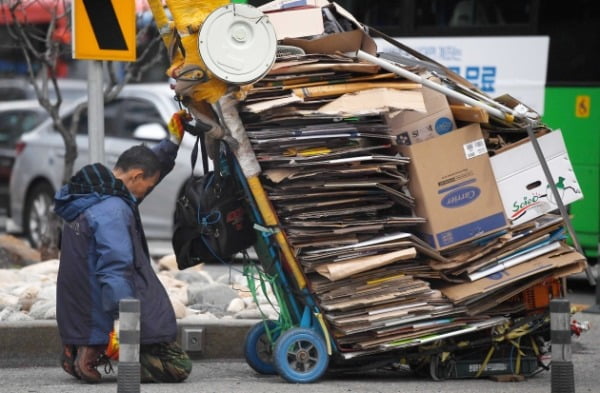Discontinued stock 3 days… To the lowest level ever
Supply and supply shortages are fixed due to various related regulations of the Ministry of Environment
Regulations such as a ban on imports of paper paper companies abolished

“Based on 100 tons, I will give you 10 million won, 20 won more per kg.”
Lee Mo, who works at a large local waste paper compression plant, lives with a calculator these days. I have to check how much is left after subtracting the purchase price from the delivery price. That’s because the price of scrap paper has been constantly changing. He complained, “I was given a positive answer by giving money and raising the price per kilogram, but I was robbed of the abolition to another place that said that I would give more price. He said, “The supply of waste paper is going to decrease gradually, but we are thinking about whether to continue the factory.”
As waste paper stocks have fallen to an all-time low, the supply and demand crisis is rapidly spreading throughout the paper industry. It is pointed out that the market is becoming turbid, with more money coming and going and prices soaring as a battle for distribution to secure inventory has taken place.
According to the abolition industry, the average inventory for abolition as of February is about 3 days, the lowest ever. Less than half of the usual average (7-8 days). A representative of a waste paper distributor complained, “At the time of the Beijing Olympics (2008), when it was really difficult to obtain abolition by sucking in waste paper in China, inventory was 4 days, but now it is worse.” The average is three days, but the common voice of the industry is that small companies that cannot handle price hikes are on the verge of closing.
The industry sees that regulation is a major cause of the abolition of the supply and demand crisis. Since the Ministry of Environment initiated regulatory legislation when inventory was excessive in the first quarter of last year, a full survey before customs clearance for abolition of imports (March last year), the abolition import declaration system (July), the grounds for the introduction of paper products EPR (September), and abolition In addition, policies focused on reducing supply, including import regulations for scrap cardboard (December), were implemented or confirmed one after another. On the other hand, waste paper stocks declined from around 110,000 tons in March last year to around 60,000 tons in June, raising concerns over supply and demand, and falling further to the 40,000 tons level in September.
An industry insider said, “Inventory was only excessive in the first quarter of last year, but as exports increased and demand for boxes increased due to the corona, it quickly found its place.” He added, “While there may be several shortages of supply and demand, the Ministry of Environment is not getting out of the frame of’excessive wastepaper’. It is said that although excesses were being resolved in accordance with market principles from the second quarter, the government did not listen to the industry that “supply and demand could come” as the government was buried in excess. The export volume, which was around 4000 tons in February, exceeded 20,000 tons in March, and increased to 40,000 tons in June.
The bigger problem is that an additional policy to further reduce the supply of waste paper is planned to prevent the trash crisis. Papermakers, who are end users of abolition from the second quarter, cannot import waste paper. Instead, a law that only waste disposal companies can import waste paper comes into force on April 1. An official in the paper industry rebelled, saying, “There is no policy in any country to allow only waste disposal companies, not paper makers, to import waste paper.” In January of next year, a regulation that allows imports of scrap bone plates of a certain strength or higher will be implemented. The industry complains that if these regulations continue, there may be a packaging disruption and an export disruption due to the lack of abolition.
It is pointed out that a policy of reducing only imports while keeping exports still while demand increases can chronicize and structure the supply and demand shortage. Kim Hyung-jin, a professor at Kookmin University’s Department of Forestry and Biotechnology, said, “Paper must be continuously recycled, but if only imports are reduced, the amount of recyclables will decrease, which will intensify the supply and demand and the quality of the waste paper will decrease. He added, “While waste can be either a resource or a waste, the standard must be carefully determined not by the government alone, but head to head with the industry.”
Reporter Kim Byeong-geun [email protected]
Ⓒ Hankyung.com prohibits unauthorized reproduction and redistribution
